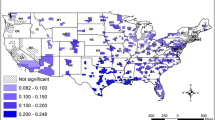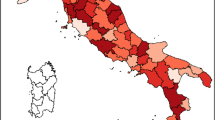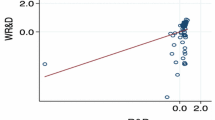Abstract
This chapter provides some evidence on the importance of geographically mediated knowledge spillovers from university research activities to regional knowledge production in high-technology industries in Austria. Spillovers occur because knowledge created by universities has some of the characteristics of public goods, and creates value for firms and other organisations. The chapter lies in the research tradition that finds thinking in terms of a production function of knowledge useful and looks for patents as a proxy of the output of this process, while university research and corporate R&D investment represent the input side. It refines the classical regional knowledge production function by introducing a more explicit measure to capture the pool of relevant spatial academic knowledge spillovers. A spatial econometric approach is used to test for the presence of spatial effects and — when needed — to implement models that include them explicitly. The empirical results confirm the presence of geographically mediated university spillovers that transcend the spatial scale of political districts. They, moreover, demonstrate that such spillovers follow a clear distance decay pattern.
Access this chapter
Tax calculation will be finalised at checkout
Purchases are for personal use only
Preview
Unable to display preview. Download preview PDF.
Similar content being viewed by others
References
Ács Z., Audretsch D.B. and Feldman M.P. (1994): R&D spillovers and recipient firm size, The Review of Economics and Statistics 76(2), 336–340
Ács Z., Audretsch D.B. and Feldman M.P. (1992): Real effects of academic research: Comment, American Economic Review 82(1), 363–367
Adams J.D. (1993): Science, R&D, and invention potential recharge: U.S. evidence, American Economic Review 83(2), 458–462
Adams J.D. (1990): Fundamental stocks of knowledge and productivity growth, Journal of Political Economy 98(4), 673–702
Alston J.M., Norton G.W. and Pardey P.G. (1998): Science under Scarcity, CAB International, New York
Anselin L. (1995): SpaceStat Version 1.90. http://www.spacestat.com
Anselin L. (1988): Spatial Econometrics: Methods and Models, Kluwer, Dordrecht, Boston
Anselin L. and Bera A. (1998): Spatial dependence in linear regression models with an introduction to spatial econometrics. In: Ullah A. and Giles D. (eds.) Handbook of Applied Economic Statistics, Marcel Dekker, New York, pp. 237–289
Anselin L. and Rey S. (1991) Properties of tests for spatial dependence in linear regression models, Geographical Analysis 23(2), 112–131
Anselin L., Varga A. and Ács Z. (2000): Geographic and sectoral characteristics of academic knowledge externalities, Papers in Regional Science 79, 435–443
Anselin L., Varga A. and Ács Z. (1997): Local geographic spillovers between university research and high technology innovations, Journal of Urban Economics 42, 422–448
Audretsch D.B. and Feldman M.P. (1994): Knowledge spillovers and the geography of innovation and production. Discussion Paper 953, Centre for Economic Policy Research, London
Audretsch D.B. and Feldman M.P. (1996): R&D spillovers and the geography of innovation and production, American Economic Review 86(3), 630–640
Bernstein J.I. and Nadiri M.I. (1988): Interindustry R&D spillovers, rates of return, and production in high-tech industries, American Economic Review 78(2), 429–434
Breusch T. and Pagan A. (1979): A simple test for heteroskedasticity and random coefficient variation, Econometrica 47(5), 1287–1294
Cohen W.M. and Levinthal D.A. (1989): Innovation and learning. The two faces of R&D, Economic Journal 99(397), 569–596
Dosi G. (1988): Sources, procedures and microeconomic effects of innovation, The Journal of Economic Literature 26(3), 1120–1126
Feldman M. (1994): The Geography of Innovation, Kluwer, Dordrecht, Boston
Feldman M.P. and Audretsch D.B. (1999): Innovation in cities: Science-based diversity, specialisation and localised competition, European Economic Review 43(2), 409–429
Feldman M.P. and Florida R. (1994): The geographic sources of innovation: Technological infrastructure and product innovation in the United States, Annals of the Association of American Geographers 84(2), 210–229
Fischer M.M., Fröhlich J. and Gassler H. (1994): An exploration into the determinants of patent activities: Some empirical evidence for Austria, Regional Studies 28(1), 1–12
Fischer M.M., Fröhlich J., Gassler H. and Varga A. (2001): The role of space in the creation of knowledge in Austria — An exploratory spatial analysis. In: Fischer M.M. and Fröhlich J. (eds.) Knowledge, Complexity and Innovation Systems, Springer, Berlin, Heidelberg, New York, pp. 124–145
Frost M.E. and Spence N.A. (1995): The rediscovery of accessibility and economic potential: The critical issue of self-potential, Environment and Planning A 27(11), 1833–1848
Geroski P. (1995): Markets of technology: Knowledge, innovation and appropriability. In: Stoneman P. (ed.) Handbook of the Economics of Innovation and Technological Change, Blackwell, Oxford [UK], Cambridge [MA], pp. 90–131
Griliches Z. (1990): Patent statistics as economic indicators: A survey, The Journal of Economic Literature 23, 1661–1707
Griliches Z. (1979): Issues in assessing the contribution of research and development to productivity growth, Bell Journal of Economics 10, 92–116
Jaffe A.B. (1989): Real effects of academic research, American Economic Review 79, 957–970
Jaffe A.B., Trajtenberg M. and Henderson R. (1993): Geographic localisation of knowledge spillovers as evidenced by patent citations, Quarterly Journal of Economics 63(3), 577–598
Kamien M.I. and Schwartz N.L. (1982): Market Structure and Innovation, Cambridge University Press, Cambridge [MA]
Karlsson C. and Manduchi A. (2001): Knowledge spillovers in a spatial context — A Critical review and assessment. In: Fischer M.M. and Fröhlich J. (eds.) Knowledge, Complexity and Innovation Systems, Springer, Berlin, Heidelberg, New York, pp. 101–123
Levin R.C., Klevorick A.K., Nelson R.R. and Winter S.G. (1987): Appropriating the returns from industrial research and development, Brookings Papers on Economic Activity 1987(3), 783–820
Mansfield E. (1995): Academic research underlying industrial innovations: Sources, characteristics, and financing, The Review of Economics and Statistics 77(1), 55–65
Mansfield E. (1991): Academic research and industrial innovation, Research Policy 20(1), 1–12
Nelson R.R. (1986): Institutions supporting technical advance in industry, American Economic Review 76(2), 186–189
OECD (1992): Technology and Economy: The Key Relationships, Organisation for Economic Co-operation and Development, Paris
Polanyi M. (1967): The Tacit Dimension, Doubleday Anchor, New York
Romer P. (1990): Endogenous technological change, Journal of Political Economy 98, 72–102
Rosenberg N. (1976): Perspective on Technology, Cambridge University Press, Cambridge [MA]
Sivitanidou R. and Sivitanides P. (1995): The intrametropolitan distribution of R&D activities: Theory and empirical evidence, Journal of Regional Science 25(3), 391–415
Varga A. (1998): University Research and Regional Innovation: A Spatial Econometric Analysis of Academic Technology Transfers, Kluwer, Dordrecht, Boston
Verspagen B. and De Loo I. (1999): Technology spillovers between sectors and over time, Technological Forecasting and Social Change 60, 215–235
Verspagen B., van Moergastel T. and Slabbers M. (1994): MERIT Concordance Table: IPC-ISIC (rev.2), MERIT Research Memorandum 2/94-004, Maastricht Economic Research Institute on Innovation and Technology, University of Limburg
White H. (1980): A heteroskedasticity-consistent covariance matrix estimation and a direct test for heteroskedasticity, Econometrica 48(4), 817–830
Rights and permissions
Copyright information
© 2006 Springer Berlin · Heidelberg
About this chapter
Cite this chapter
Varga, A. (2006). Spatial Knowledge Spillovers and University Research: Evidence from Austria. In: Innovation, Networks, and Knowledge Spillovers. Springer, Berlin, Heidelberg . https://doi.org/10.1007/3-540-35981-8_10
Download citation
DOI: https://doi.org/10.1007/3-540-35981-8_10
Publisher Name: Springer, Berlin, Heidelberg
Print ISBN: 978-3-540-35980-7
Online ISBN: 978-3-540-35981-4
eBook Packages: Business and EconomicsBusiness and Management (R0)




